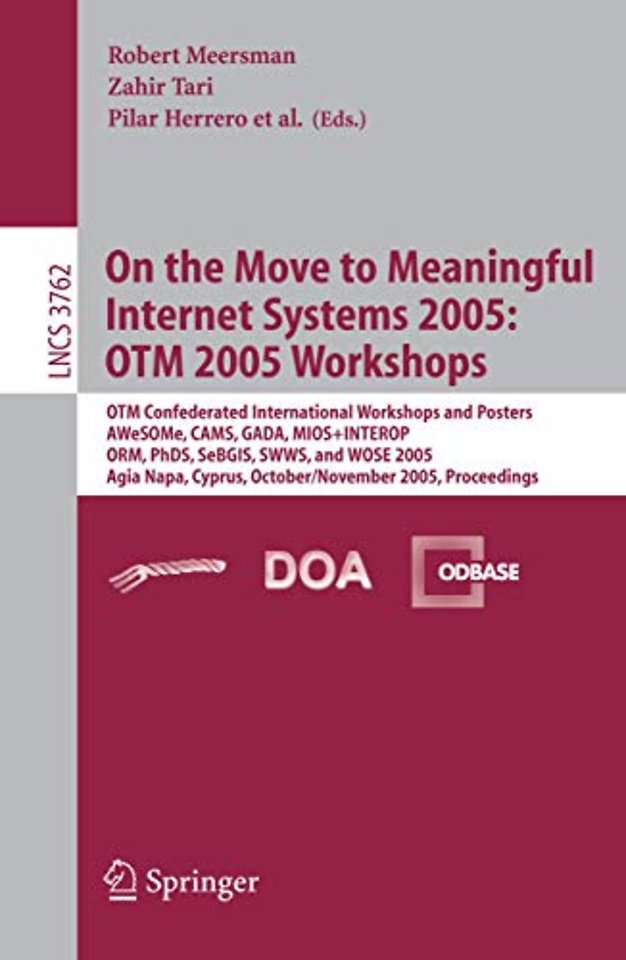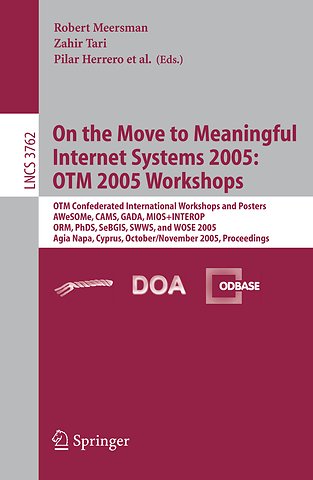Posters of the 2005 CoopIS (Cooperative Information Systems) International Conference.- Checking Workflow Schemas with Time Constraints Using Timed Automata.- Cooperation Between Utility IT Systems: Making Data and Applications Work Together.- Adapting Rigidly Specified Workflow in the Absence of Detailed Ontology.- Modelling and Streaming Spatiotemporal Audio Data.- Enhancing Project Management for Periodic Data Production Management.- Cooperating Services in a Mobile Tourist Information System.- Posters of the 2005 DOA (Distributed Objects and Applications) International Conference.- Flexible and Maintainable Contents Activities in Ubiquitous Environment.- Using Model-Driven and Aspect-Oriented Development to Support End-User Quality of Service.- A Generic Approach to Dependability in Overlay Networks.- An XML-Based Cross-Language Framework.- Software Design of Electronic Interlocking System Based on Real-Time Object-Oriented Modeling Technique.- Posters of the 2005 ODBASE (Ontologies, Databases, and Applications of Semantics) International Conference.- Ontology Based Negotiation Case Search System for the Resolution of Exceptions in Collaborative Production Planning.- Enhanced Workflow Models as a Tool for Judicial Practitioners.- Semantics of Information Systems Outsourcing.- Integration of Heterogeneous Knowledge Sources in the CALO Query Manager.- Context Knowledge Discovery in Ubiquitous Computing.- Ontology-Based Integration for Relational Data.- Workshop on Agents, Web Services and Ontologies Merging (AWeSOMe).- AWeSOMe 2005 PC Co-chairs’ Message.- Document Flow Model: A Formal Notation for Modelling Asynchronous Web Services Composition.- Realising Personalised Web Service Composition Through Adaptive Replanning.- Semantic Web Services Discovery in Multi-ontology Environment.- Security and Semantics.- On the Application of the Semantic Web Rule Language in the Definition of Policies for System Security Management.- On Secure Framework for Web Services in Untrusted Environment.- An Approach for Semantic Query Processing with UDDI.- Agents for Web Service Support.- A Multiagent-Based Approach for Progressive Web Map Generation.- Semantics of Agent-Based Service Delegation and Alignment.- Workshop on Context-Aware Mobile Systems (CAMS).- CAMS 2005 PC Co-chairs’ Message.- Personalising Context-Aware Applications.- Management of Heterogeneous Profiles in Context-Aware Adaptive Information System.- Context-Aware Recommendations on the Mobile Web.- Querying and Fetching.- Capturing Context in Collaborative Profiles.- Using Context of a Mobile User to Prefetch Relevant Information.- Development and Engineering.- Location-Based Mobile Querying in Peer-to-Peer Networks.- Seamless Engineering of Location-Aware Services.- Location.- Context-Aware Negotiation for Reconfigurable Resources with Handheld Devices.- Location-Aware Web Service Architecture Using WLAN Positioning.- A Light-Weight Framework for Location-Based Services.- Architecture and Models.- Context Awareness for Music Information Retrieval Using JXTA Technology.- A Model of Pervasive Services for Service Composition.- Selection Using Non-symmetric Context Areas.- Sharing Context Information in Semantic Spaces.- Grid Computing Workshop (GADA).- GADA 2005 PC Co-chairs’ Message.- Web Services Approach in the Grid.- Coordinated Use of Globus Pre-WS and WS Resource Management Services with GridWay.- Web-Services Based Modelling/Optimisation for Engineering Design.- Workflow Management System Based on Service Oriented Components for Grid Applications.- Grid Applications.- Life Science Grid Middleware in a More Dynamic Environment.- A Grid-Aware Implementation for Providing Effective Feedback to On-Line Learning Groups.- Security and Ubiquitous Computing.- Caching OGSI Grid Service Data to Allow Disconnected State Retrieval.- Shelter from the Storm: Building a Safe Archive in a Hostile World.- Event Broker Grids with Filtering, Aggregation, and Correlation for Wireless Sensor Data.- Distributed Authentication in GRID5000.- Performance Enhancement in the Grid.- A Load Balance Methodology for Highly Compute-Intensive Applications on Grids Based on Computational Modeling.- Providing Autonomic Features to a Data Grid.- TCP Performance Enhancement Based on Virtual Receive Buffer with PID Control Mechanism.- Databases on the Grid.- Computational Grid vs. Parallel Computer for Coarse-Grain Parallelization of Neural Networks Training.- Object-Oriented Wrapper for Relational Databases in the Data Grid Architecture.- Modeling Object Views in Distributed Query Processing on the Grid.- Optimization of Distributed Queries in Grid Via Caching.- Replication.- Modelling the + ROWA Model Approach Inside the WS-ReplicationResource.- Workshop on Inter-organizational Systems and Interoperability of Enterprise Software and Applications (MIOS+INTEROP).- MIOS+INTEROP 2005 PC Co-chairs’ Message.- Service Modelling.- Registering a Business Collaboration Model in Multiple Business Environments.- Component Oriented Design and Modeling of Cross-Enterprise Service Processes.- Comparing the Impact of Service-Oriented and Object-Oriented Paradigms on the Structural Properties of Software.- The Impact of Software Development Strategies on Project and Structural Software Attributes in SOA.- Service Choreography and Orchestration.- An Hybrid Intermediation Architectural Approach for Integrating Cross-Organizational Services.- A Framework Supporting Dynamic Workflow Interoperation.- A Text Mining Approach to Integrating Business Process Models and Governing Documents.- A Process-Driven Inter-organizational Choreography Modeling System.- A Petri Net Based Approach for Process Model Driven Deduction of BPEL Code.- From Inter-organizational Workflows to Process Execution: Generating BPEL from WS-CDL.- PIT-P2M: ProjectIT Process and Project Metamodel.- Interoperability of Networked Enterprise Applications.- Requirements for Secure Logging of Decentralized Cross-Organizational Workflow Executions.- Access Control Model for Inter-organizational Grid Virtual Organizations.- Interoperability Supported by Enterprise Modelling.- Using Ontologies for XML Data Cleaning.- Applying Patterns for Improving Subcontracting Management.- Evaluation of Strategic Supply Networks.- Self Modelling Knowledge Networks.- Workshop on Object-Role Modeling (ORM).- ORM 2005 PC Co-chairs’ Message.- Schema Management.- Using Abstractions to Facilitate Management of Large ORM Models and Ontologies.- Modularization and Automatic Composition of Object-Role Modeling (ORM) Schemes.- Modelling Context Information with ORM.- Industry Perspectives.- Using Object Role Modeling for Effective In-House Decision Support Systems.- Requirements Engineering with ORM.- Beyond Data Modeling.- Generating Applications from Object Role Models.- A Fact-Oriented Approach to Activity Modeling.- Future Directions.- ORM 2.- A World Ontology Specification Language.- Applications.- Using ORM to Model Web Systems.- Object Role Modelling for Ontology Engineering in the DOGMA Framework.- Formal Underpinnings.- Fact Calculus: Using ORM and Lisa-D to Reason About Domains.- Schema Equivalence as a Counting Problem.- Ph.D. Student Symposium.- PhDS 2005 PC Co-chairs’ Message.- Accelerating Distributed New Product Development by Exploiting Information and Communication Technology.- Towards QoS-Awareness of Context-Aware Mobile Applications and Services.- Supporting the Developers of Context-Aware Mobile Telemedicine Applications.- Multilingual Semantic Web Services.- Improving Information Retrieval Effectiveness by Using Domain Knowledge Stored in Ontologies.- Top-k Skyline: A Unified Approach.- Judicial Support Systems: Ideas for a Privacy Ontology-Based Case Analyzer.- IFIP WG 2.12 and WG 12.4 International Workshop on Web Semantics (SWWS).- SWWS 2005 PC Co-chairs’ Message.- Invited Papers on TRUST.- Adding a Peer-to-Peer Trust Layer to Metadata Generators.- Building a Fuzzy Trust Network in Unsupervised Multi-agent Environments.- Regulatory Ontologies (WORM).- Building e-Laws Ontology: New Approach.- Generation of Standardised Rights Expressions from Contracts: An Ontology Approach?.- OPJK into PROTON: Legal Domain Ontology Integration into an Upper-Level Ontology.- Applications of Semantic Web I (SWWS).- Semantic Transformation of Web Services.- Modeling Multi-party Web-Based Business Collaborations.- A Framework for Task Retrieval in Task-Oriented Service Navigation System.- Realizing Added Value with Semantic Web.- Applications of Semantic Web II (SWWS).- Ontology-Based Searching Framework for Digital Shapes.- Ontology Metadata Vocabulary and Applications.- Ontological Foundation for Protein Data Models.- Modeling and Querying Techniques for Semantic Web (SWWS).- SWQL – A Query Language for Data Integration Based on OWL.- Modeling Views for Semantic Web Using eXtensible Semantic (XSemantic) Nets.- On the Cardinality of Schema Matching.- Reputation Ontology for Reputation Systems.- Ontologies (SWWS).- Translating XML Web Data into Ontologies.- Self-tuning Personalized Information Retrieval in an Ontology-Based Framework.- Detecting Ontology Change from Application Data Flows.- Workshop on Semantic-based Geographical Information Systems (SeBGIS).- SeBGIS 2005 PC Co-chairs’ Message.- Measuring, Evaluating and Enriching Semantics.- How to Enrich the Semantics of Geospatial Databases by Properly Expressing 3D Objects in a Conceptual Model.- Evaluating Semantic Similarity Using GML in Geographic Information Systems.- Measuring Semantic Differences Between Conceptualisations: The Portuguese Water Bodies Case – Does Education Matter?.- Schemata Integration.- Spatio-temporal Schema Integration with Validation: A Practical Approach.- Preserving Semantics When Transforming Conceptual Spatio-temporal Schemas.- Using Image Schemata to Represent Meaningful Spatial Configurations.- Geovisualization and Spatial Semantics.- Collaborative geoVisualization: Object-Field Representations with Semantic and Uncertainty Information.- Semantics of Collinearity Among Regions.- Automatic Acquisition of Fuzzy Footprints.- The Double-Cross and the Generalization Concept as a Basis for Representing and Comparing Shapes of Polylines.- Algorithms and Data Structures.- Range and Nearest Neighbor Query Processing for Mobile Clients.- An Efficient Trajectory Index Structure for Moving Objects in Location-Based Services.- Systems and Tools.- MECOSIG Adapted to the Design of Distributed GIS.- The Emerge of Semantic Geoportals.- Ontology Assisted Decision Making – A Case Study in Trip Planning for Tourism.- Workshop on Ontologies, Semantics and E-Learning (WOSE).- WOSE 2005 PC Co-chairs’ Message.- E-Learning and Ontologies.- Towards the Integration of Performance Support and e-Learning: Context-Aware Product Support Systems.- Taking Advantage of LOM Semantics for Supporting Lesson Authoring.- Repurposing Learning Object Components.- Ontology Technology for E-learning.- Interoperable E-Learning Ontologies Using Model Correspondences.- Towards Ontology-Guided Design of Learning Information Systems.- Learning to Generate an Ontology-Based Nursing Care Plan by Virtual Collaboration.- Ontologies and Virtual Reality.- Generating and Evaluating Triples for Modelling a Virtual Environment.- An Ontology-Driven Approach for Modeling Behavior in Virtual Environments.

